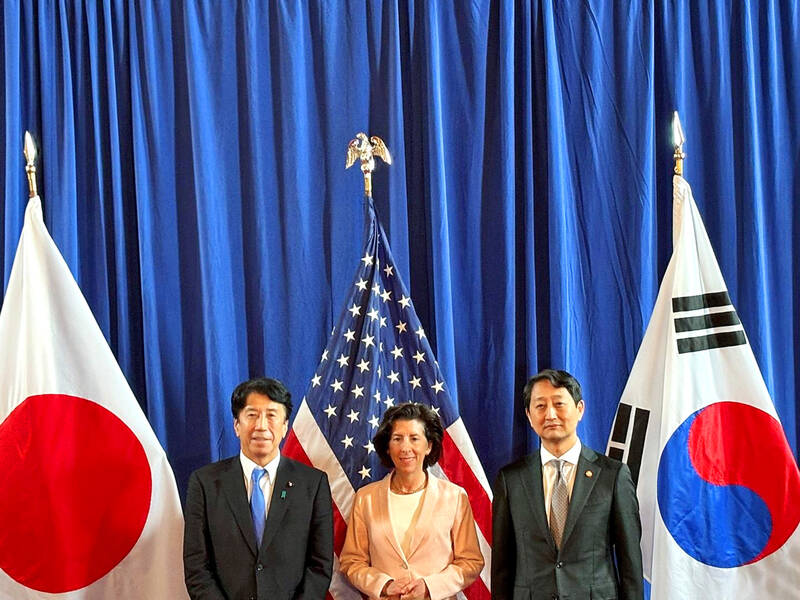Commerce and trade ministers from the US, Japan and South Korea on Wednesday vowed to cooperate on strategic issues, including artificial intelligence (AI) safety, export controls, clean energy and semiconductor supply chains.
“We’re doubling down our efforts to work together,” US Secretary of Commerce Gina Raimondo said at a meeting in Washington.
“As we three are leading economies in manufacturing, services, technology and innovation, and we have to work together to benefit not just our countries, but the safety and security of the world,” Raimondo said.

Photo:EPA-EFE
She was joined at the inaugural trilateral meeting by Japanese Minister of Economy, Trade and Industry Ken Saito and South Korean Minister of Trade, Industry and Energy Ahn Duk-geun. The meetings were decided last year by the countries’ leaders at an August summit at Camp David.
The ministers said in a statement after the meeting that they would “focus our joint efforts on a set of strategic areas designed to enhance the security and prosperity of our people and the Indo-Pacific region. We aim to prioritize cooperation to strengthen the resilience of supply chains in key sectors, including semiconductors and batteries,” as well as AI safety, critical minerals, cybersecurity and technical standard setting.
Saito said the three “agreed to realize a strong and reliable supply chain for strategic materials by working together with like-minded countries, including Japan, the United States and South Korea, and designing a market where factors other than price are fairly evaluated.”
Last month, US President Joe Biden vowed to sharply increase tariffs on critical minerals from China, as Washington vowed to reduce China’s dominance of critical mineral supply chains.
In March, a Department of Commerce official said the US was asking allies to stop domestic companies from servicing certain chipmaking tools for Chinese customers, a key part of the US’ push to hobble China’s chipmaking capabilities.
“We expect the South Korea-US-Japan industry ministers’ meeting to serve as an institutional basis for deepening and developing industrial cooperation among the three countries and jointly responding to global risks,” Ahn said.

MULTIFACETED: A task force has analyzed possible scenarios and created responses to assist domestic industries in dealing with US tariffs, the economics minister said The Executive Yuan is tomorrow to announce countermeasures to US President Donald Trump’s planned reciprocal tariffs, although the details of the plan would not be made public until Monday next week, Minister of Economic Affairs J.W. Kuo (郭智輝) said yesterday. The Cabinet established an economic and trade task force in November last year to deal with US trade and tariff related issues, Kuo told reporters outside the legislature in Taipei. The task force has been analyzing and evaluating all kinds of scenarios to identify suitable responses and determine how best to assist domestic industries in managing the effects of Trump’s tariffs, he

TIGHT-LIPPED: UMC said it had no merger plans at the moment, after Nikkei Asia reported that the firm and GlobalFoundries were considering restarting merger talks United Microelectronics Corp (UMC, 聯電), the world’s No. 4 contract chipmaker, yesterday launched a new US$5 billion 12-inch chip factory in Singapore as part of its latest effort to diversify its manufacturing footprint amid growing geopolitical risks. The new factory, adjacent to UMC’s existing Singapore fab in the Pasir Res Wafer Fab Park, is scheduled to enter volume production next year, utilizing mature 22-nanometer and 28-nanometer process technologies, UMC said in a statement. The company plans to invest US$5 billion during the first phase of the new fab, which would have an installed capacity of 30,000 12-inch wafers per month, it said. The

Taiwan’s official purchasing managers’ index (PMI) last month rose 0.2 percentage points to 54.2, in a second consecutive month of expansion, thanks to front-loading demand intended to avoid potential US tariff hikes, the Chung-Hua Institution for Economic Research (CIER, 中華經濟研究院) said yesterday. While short-term demand appeared robust, uncertainties rose due to US President Donald Trump’s unpredictable trade policy, CIER president Lien Hsien-ming (連賢明) told a news conference in Taipei. Taiwan’s economy this year would be characterized by high-level fluctuations and the volatility would be wilder than most expect, Lien said Demand for electronics, particularly semiconductors, continues to benefit from US technology giants’ effort

‘SWASTICAR’: Tesla CEO Elon Musk’s close association with Donald Trump has prompted opponents to brand him a ‘Nazi’ and resulted in a dramatic drop in sales Demonstrators descended on Tesla Inc dealerships across the US, and in Europe and Canada on Saturday to protest company chief Elon Musk, who has amassed extraordinary power as a top adviser to US President Donald Trump. Waving signs with messages such as “Musk is stealing our money” and “Reclaim our country,” the protests largely took place peacefully following fiery episodes of vandalism on Tesla vehicles, dealerships and other facilities in recent weeks that US officials have denounced as terrorism. Hundreds rallied on Saturday outside the Tesla dealership in Manhattan. Some blasted Musk, the world’s richest man, while others demanded the shuttering of his